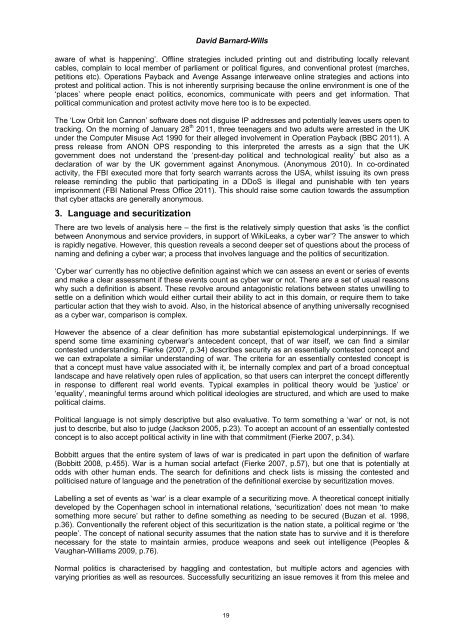(in) Security - Academic Conferences Limited
(in) Security - Academic Conferences Limited
(in) Security - Academic Conferences Limited
You also want an ePaper? Increase the reach of your titles
YUMPU automatically turns print PDFs into web optimized ePapers that Google loves.
David Barnard-Wills<br />
aware of what is happen<strong>in</strong>g’. Offl<strong>in</strong>e strategies <strong>in</strong>cluded pr<strong>in</strong>t<strong>in</strong>g out and distribut<strong>in</strong>g locally relevant<br />
cables, compla<strong>in</strong> to local member of parliament or political figures, and conventional protest (marches,<br />
petitions etc). Operations Payback and Avenge Assange <strong>in</strong>terweave onl<strong>in</strong>e strategies and actions <strong>in</strong>to<br />
protest and political action. This is not <strong>in</strong>herently surpris<strong>in</strong>g because the onl<strong>in</strong>e environment is one of the<br />
‘places’ where people enact politics, economics, communicate with peers and get <strong>in</strong>formation. That<br />
political communication and protest activity move here too is to be expected.<br />
The ‘Low Orbit Ion Cannon’ software does not disguise IP addresses and potentially leaves users open to<br />
track<strong>in</strong>g. On the morn<strong>in</strong>g of January 28 th 2011, three teenagers and two adults were arrested <strong>in</strong> the UK<br />
under the Computer Misuse Act 1990 for their alleged <strong>in</strong>volvement <strong>in</strong> Operation Payback (BBC 2011). A<br />
press release from ANON OPS respond<strong>in</strong>g to this <strong>in</strong>terpreted the arrests as a sign that the UK<br />
government does not understand the ‘present-day political and technological reality’ but also as a<br />
declaration of war by the UK government aga<strong>in</strong>st Anonymous. (Anonymous 2010). In co-ord<strong>in</strong>ated<br />
activity, the FBI executed more that forty search warrants across the USA, whilst issu<strong>in</strong>g its own press<br />
release rem<strong>in</strong>d<strong>in</strong>g the public that participat<strong>in</strong>g <strong>in</strong> a DDoS is illegal and punishable with ten years<br />
imprisonment (FBI National Press Office 2011). This should raise some caution towards the assumption<br />
that cyber attacks are generally anonymous.<br />
3. Language and securitization<br />
There are two levels of analysis here – the first is the relatively simply question that asks ‘is the conflict<br />
between Anonymous and service providers, <strong>in</strong> support of WikiLeaks, a cyber war’? The answer to which<br />
is rapidly negative. However, this question reveals a second deeper set of questions about the process of<br />
nam<strong>in</strong>g and def<strong>in</strong><strong>in</strong>g a cyber war; a process that <strong>in</strong>volves language and the politics of securitization.<br />
‘Cyber war’ currently has no objective def<strong>in</strong>ition aga<strong>in</strong>st which we can assess an event or series of events<br />
and make a clear assessment if these events count as cyber war or not. There are a set of usual reasons<br />
why such a def<strong>in</strong>ition is absent. These revolve around antagonistic relations between states unwill<strong>in</strong>g to<br />
settle on a def<strong>in</strong>ition which would either curtail their ability to act <strong>in</strong> this doma<strong>in</strong>, or require them to take<br />
particular action that they wish to avoid. Also, <strong>in</strong> the historical absence of anyth<strong>in</strong>g universally recognised<br />
as a cyber war, comparison is complex.<br />
However the absence of a clear def<strong>in</strong>ition has more substantial epistemological underp<strong>in</strong>n<strong>in</strong>gs. If we<br />
spend some time exam<strong>in</strong><strong>in</strong>g cyberwar’s antecedent concept, that of war itself, we can f<strong>in</strong>d a similar<br />
contested understand<strong>in</strong>g. Fierke (2007, p.34) describes security as an essentially contested concept and<br />
we can extrapolate a similar understand<strong>in</strong>g of war. The criteria for an essentially contested concept is<br />
that a concept must have value associated with it, be <strong>in</strong>ternally complex and part of a broad conceptual<br />
landscape and have relatively open rules of application, so that users can <strong>in</strong>terpret the concept differently<br />
<strong>in</strong> response to different real world events. Typical examples <strong>in</strong> political theory would be ‘justice’ or<br />
‘equality’, mean<strong>in</strong>gful terms around which political ideologies are structured, and which are used to make<br />
political claims.<br />
Political language is not simply descriptive but also evaluative. To term someth<strong>in</strong>g a ‘war’ or not, is not<br />
just to describe, but also to judge (Jackson 2005, p.23). To accept an account of an essentially contested<br />
concept is to also accept political activity <strong>in</strong> l<strong>in</strong>e with that commitment (Fierke 2007, p.34).<br />
Bobbitt argues that the entire system of laws of war is predicated <strong>in</strong> part upon the def<strong>in</strong>ition of warfare<br />
(Bobbitt 2008, p.455). War is a human social artefact (Fierke 2007, p.57), but one that is potentially at<br />
odds with other human ends. The search for def<strong>in</strong>itions and check lists is miss<strong>in</strong>g the contested and<br />
politicised nature of language and the penetration of the def<strong>in</strong>itional exercise by securitization moves.<br />
Labell<strong>in</strong>g a set of events as ‘war’ is a clear example of a securitiz<strong>in</strong>g move. A theoretical concept <strong>in</strong>itially<br />
developed by the Copenhagen school <strong>in</strong> <strong>in</strong>ternational relations, ‘securitization’ does not mean ‘to make<br />
someth<strong>in</strong>g more secure’ but rather to def<strong>in</strong>e someth<strong>in</strong>g as need<strong>in</strong>g to be secured (Buzan et al. 1998,<br />
p.36). Conventionally the referent object of this securitization is the nation state, a political regime or ‘the<br />
people’. The concept of national security assumes that the nation state has to survive and it is therefore<br />
necessary for the state to ma<strong>in</strong>ta<strong>in</strong> armies, produce weapons and seek out <strong>in</strong>telligence (Peoples &<br />
Vaughan-Williams 2009, p.76).<br />
Normal politics is characterised by haggl<strong>in</strong>g and contestation, but multiple actors and agencies with<br />
vary<strong>in</strong>g priorities as well as resources. Successfully securitiz<strong>in</strong>g an issue removes it from this melee and<br />
19

















